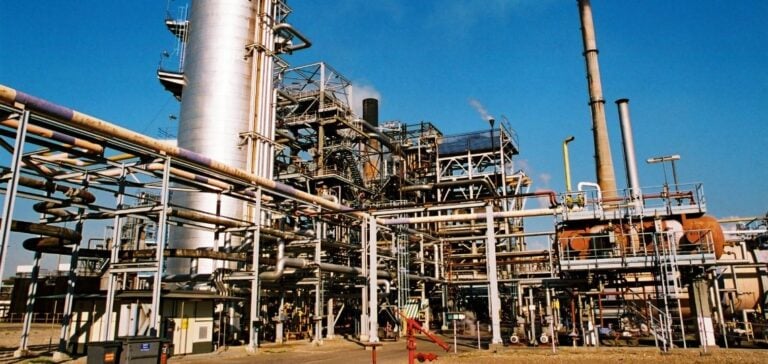In the third quarter of 2024, ExxonMobil and Chevron, two major players in the energy sector, reported financial results impacted by a drop in refining margins. However, increased production volumes and shareholder-focused financial measures helped to partially mitigate this effect.
ExxonMobil posted a net profit of $8.61 billion, exceeding FactSet analysts’ expectations of $8.28 billion, although its revenue of $90 billion was below the projected $93.98 billion. This performance was affected by a $3.9 billion reduction in refining margins compared to the third quarter of 2023, despite a $3.3 billion increase thanks to higher production volumes.
The company reached a record liquid production level of 3.2 million barrels per day. Darren Woods, ExxonMobil’s CEO, noted that the company had “doubled the profitability of barrels produced” in the exploration and production sector (upstream) since 2019, taking into account constant prices. Global demand for refined products supported performance, though increased competition put pressure on margins.
Rationalization and Cost Reduction
As part of its rationalization strategy, ExxonMobil reduced the number of refineries from 45 in 1999 to 22 in 2017, with a target of 15 refineries by the end of 2024. This initiative aims to optimize costs and increase overall profitability. Additionally, the group reduced its structural costs by $600 million, bringing total savings since 2019 to $11.3 billion, with a goal of reaching $15 billion by 2027.
In terms of shareholder returns, ExxonMobil distributed $9.8 billion between July and September, bringing the annual total to $26.1 billion in dividends and share buybacks. This policy reflects the company’s financial strength despite margin pressures.
Chevron’s Financial Performance
Chevron also saw a reduction in refining margins but reported financial results that exceeded expectations. Its revenue reached $50.67 billion, down 6.3% year-on-year, while net income fell 31% to $4.49 billion. Adjusted for exceptional items, earnings per share were $2.51, beating forecasts of $2.43.
Chevron CEO Mike Wirth stated that the company is continuing to optimize its asset portfolio and reduce costs to provide greater long-term value to shareholders. Chevron’s international operations contributed to this performance, with a 2.6% increase in production volumes.
Third Bridge analysts noted that these results were better than expected, especially internationally, where Chevron’s activities in exploration, production, and refining were positively received. Chevron also maintained a record level of shareholder returns, reaching $7.7 billion for the quarter through buybacks and dividends.
Impact on Shares and Outlook
These results had a positive effect on both companies’ shares on the New York Stock Exchange. Chevron’s stock rose by 3.81%, while ExxonMobil’s stock increased by 0.32%. Demand for refined products remains favorable, although margins continue to be pressured amid intense competition.
For both giants, long-term profitability and shareholder support remain priorities. ExxonMobil and Chevron are adapting their operations to energy market trends and continue to pursue a strategy to maximize asset value while maintaining investor confidence.






















